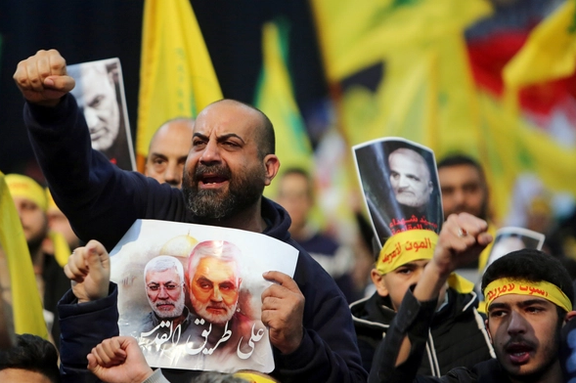Twelve kids and teenagers were killed in the rocket attack on a soccer pitch in the Druze town of Majdal Shams in the Israeli-occupied Golan Heights. The Israeli military has vowed to retaliate against Hezbollah, which both Israel and the US blame for the strike.
In a Monday phone call with French President Emmanuel Macron, Masoud Pezeshkian asserted that Israel’s plans to retaliate “could backfire and have severe consequences for the Zionists themselves.”
In turn, Macron said Iran had "a role to play to avoid escalation in the Lebanon-Israel tension by halting support to destabilizing players," according to the French presidency's readout of the phone call.
While Hezbollah have denied any role, Israeli military spokesman Daniel Hagari said on Saturday the rocket used in the deadly attack was an Iranian-made Falaq-1 fired by Hezbollah. Hagari described it as the "most serious targeting" of Israeli civilians since the October 7 attack on Israel by Iran-funded Hamas.
The Biden administration on Monday maintained that Israel “has a right to respond” to the attack, but believed fears the attack could lead to a broader war were “exaggerated.”
Asked about fears of a broader conflict in the region, White House national security spokesperson John Kirby responded that at “multiple points over the last 10 months, those predictions were exaggerated,” he added “Quite frankly we think they’re exaggerated now.”
Still, several airlines, including Lufthansa, Turkish Airlines, Aegean Airlines, Ethiopian Air, and Middle East Airlines, have canceled flights to Beirut for July 29-30, anticipating an Israeli response to the Hezbollah attack.
Several countries, including the US, UK, and France, also issued urgent travel advisories on Sunday, urging their citizens to avoid travel to Lebanon or to leave the country immediately.
Several observers have criticized the narrative that Israel’s response should be restrained due to fears of an all-out regional conflict.
Senior advisor at the FDD think-tank, Richard Goldberg, stated on X, “Iran has been waging a multi-front regional war for more than 9 months. Pressuring Israel to accept every escalation by Iran’s terror axis as a new normal brought us to this moment.”
“The ‘regional war’ talking point is gibberish. Israel is being attacked from Gaza, the West Bank, Lebanon, Syria, Iraq, Iran, and Yemen. Who else is going to join in? Biden-Harris officials use the line all the time but no one asks ‘uhhh what other country will this expand to?’," an adviser to US Republican Senator Ted Cruz, Omri Ceren wrote.
As Lebanon braces for retaliation, two Israeli officials told Reuters that the country has no intention to drag the Middle East into an all-out war. Two other Israeli officials told the outlet that the country was preparing for the possibility of a few days of fighting.
According to security sources, Hezbollah has preemptively evacuated several key sites in southern Lebanon and the eastern Bekaa Valley in anticipation of a potential attack by Israel.
This follows comments by Israel’s Foreign Minister, Israel Katz, who stated on Israeli television on Saturday, “We are approaching the moment of an all-out war against Hezbollah,” and added, “The response to this event will be accordingly.”After an emergency session since the attack, the Israeli security cabinet has empowered Prime Minister Benjamin Netanyahu and his defense minister to determine the timing and manner of retaliation.
While the Iranian-backed Lebanese militant group has denied responsibility for the strike, Germany and the US have joined Israel in unequivocally blaming Hezbollah for it.
“This attack was conducted by Lebanese Hezbollah. It was their rocket, and launched from an area they control,” a statement by White House NSC Spokesperson Adrienne Watson read.
Israel maintains that the attack was carried out with the Iranian-made Falaq-1 rocket with a 100-pound warhead and that only Hezbollah holds such rockets in Lebanon.
Iran appeared to deny playing a role in the attack, when it issued a vague statement by a foreign ministry spokesperson.
Germany on Monday called on all parties to the Middle East conflict, in particular Iran, to prevent an escalation.
A Foreign Ministry spokesperson stated that Berlin "assumes with certainty" that the attack was conducted by Hezbollah, additionally highlighting that recent actions by the Iran-supported Houthi militia in Yemen have also significantly contributed to regional instability.
The hostilities between Israel and Hezbollah, largely triggered by the war in Gaza, are their worst since the 2006 conflict.
Hezbollah, an ally of the Palestinian terror group Hamas, has vowed that its rocket and drone attacks on Israel will continue until Israel's offensive on Gaza ceases. The conflict at the Israel-Lebanon border has forced tens of thousands of people to leave their homes on both sides.








